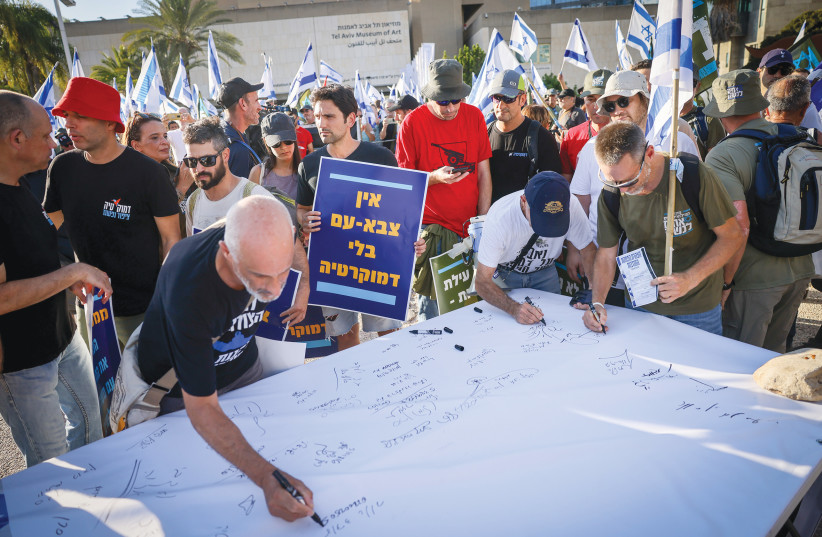Has the IDF's people's army model collapsed?
A volunteer civilian army is possible only when a shared core of social values exists among citizens. But deepening social and political tensions has threatened this system.

CHAIM GOLDBEG/FLASH90
One of the grave repercussions of the political struggle over the planned changes to Israel’s governance and judicial system relates to the implications for the IDF. Before the “reasonableness bill” was passed, over 1,000 air force crew members and approximately 10,000 reservists from other units signed declarations announcing the end of their volunteer service for reserve duty.
Hundreds of them have, indeed, already ended their service. According to various reports, including today’s security meeting, the military is deeply concerned about the adverse effects on the operational capabilities of various units, and on internal cohesion and social solidarity.
The debate playing out across the Israeli public and the media oscillates between the idea that these protests are “dangerous insubordination” and the idea that they are legitimate civil dissent. A senior political commentator even explained that the moment the challenge of reservists ending their volunteer service was put forward, the Government had no choice but to pass the legislation in order to uphold the fundamental principle of the political echelon’s power over the military echelon.
This debate of whether the reservists’ actions represent insubordination or simply the end of their volunteer service, frankly, misses the point. Reservists ending their volunteer service is the symptom, not the essence of this phenomenon. The crux of this phenomenon is the ongoing undermining of the people’s army model, with the latest political events endangering the very existence of the model, thus risking its collapse.
Why the judicial reform debate is helping collapse the people's army model
Israel’s model of service is based, to a large extent, on the individual volunteering for the good of the collective. Even though all Israeli youth are required to serve for a mandatory period in the IDF, according to IDF data from 2022, only 69% of Jewish men and approximately 56% of Jewish women enlist in the army.
If youth from the Arab sector who are not conscripted are added to this calculation, far less than 50% of each relevant cohort is recruited into the IDF. Among those who serve, the army needs volunteers for elite units for service as officers, and those who wish to continue to serve in the standing army.
Reserve duty is also essentially voluntary, as only a small percent of each recruitment cohort is called for reserve duty of significant length. And so, in effect, the extent of volunteering in the IDF is quite significant and de facto constitutes the backbone of the entire military apparatus.
A VOLUNTEER civilian army is possible only when a shared core of social values exists among citizens. Those who feel that the country, and its military, no longer reflect their values, cannot be expected to continue to volunteer. Indeed, social and political tensions have existed in Israel for many years: The debate over Israeli control over Judea and Samaria; tensions between the religious and the secular people; the fact that the ultra-Orthodox do not serve in the military; and the execution of the Gaza Disengagement Plan, to name a few. Despite these divisions, public opinion in Israel did not question the IDF’s service model, and refusal to serve was scarce.
In recent years, however, there has been an ongoing change in public opinion regarding military service. The social and political tensions have deepened, and on a number of occasions, various groups have already threatened to avoid service if their position on various issues was not accepted, for example regarding service in mixed-gender units.
Surveys conducted by the Israeli Democracy Institute reveal that increasing numbers of the Israeli Jewish public support moving away from the current model of service to a professional army model (that is, a paid voluntary army, as is customary in many other countries). Among younger age groups, the majority already support this change.
Under these circumstances, we would expect the coalition to act with caution with regard to the issue of IDF service. Protest participants include significant segments of Israeli society, with a high proportion of their sons and daughters serving in the IDF, constituting the backbone of some units. Of course, the children of those who support the changes to the judicial system also serve in the IDF, but specifically in this context, the coalition’s makeup is problematic: Significant numbers among the groups that support the coalition do not serve in the IDF or perform only partial service. This is the case for the sons and daughters of the ultra-Orthodox sector, as well as for a significant percentage of national religious women. Rather than adopting a cautious approach, the coalition has attempted to defeat its opponents by passing the reasonableness bill in its extreme version, and labeling the volunteers as insubordinates.
The IDF, and the entire State of Israel, risk paying a heavy price for the coalition’s short-sightedness. The IDF may succeed in getting by without the few thousand volunteers who ended their service immediately. But the entire people’s army model is based on volunteering, and the model will not survive if this volunteering is significantly harmed.
In fact, it is reasonable to assume that the collapse of the people’s army model is well underway, and only significant action by the Government, which is responsible for Israel’s security, can come to the rescue.
This article was originally published in the Jerusalem Post.
